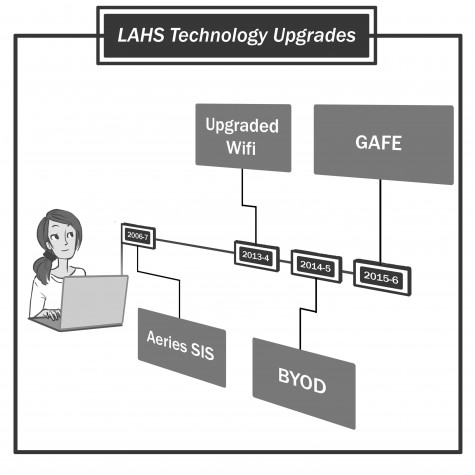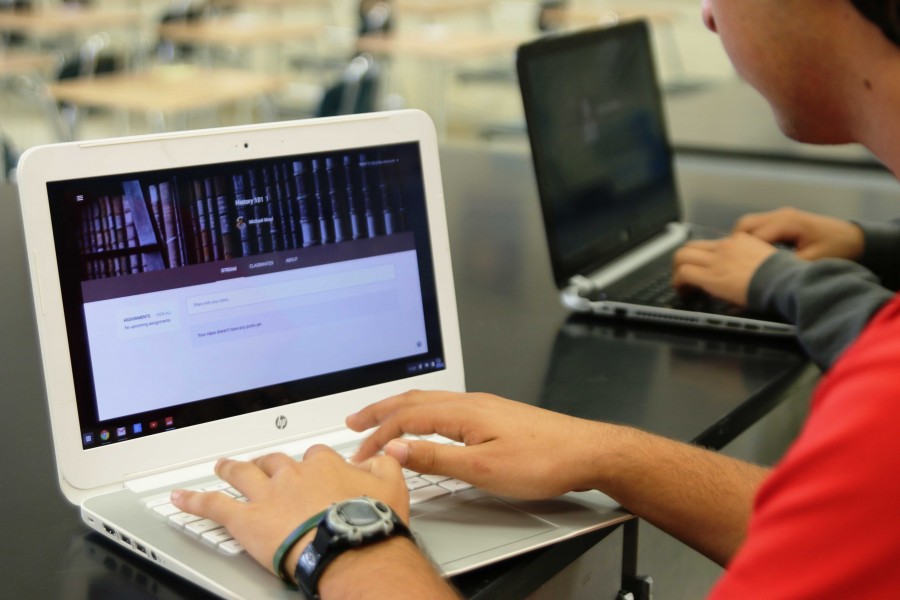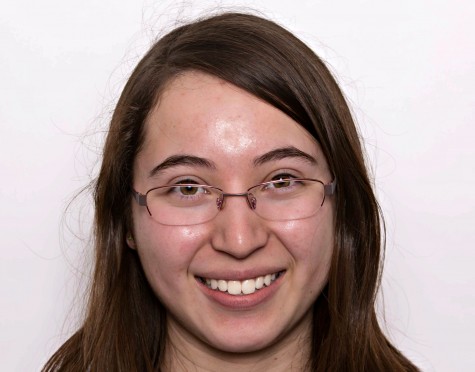School to implement learning management system
Photo-illustration by Carl Faust
A student works on the new learning management system, Google Apps for Education. The technology initiative will be introduced this school year and involves every student at the school receiving his or her own MVLA email address.
Beginning this school year, all students will be issued a Mountain View Los Altos (MVLA) email address as part of the the implementation of a new learning platform, Google Apps for Education (GAFE). GAFE will integrate all Google services into one app and allow teachers to issue and grade assignments through the app.
“All of the classroom based activities that were previously done via [personal] email… will be done via the new email from Google,” Assistant Principal Galen Rosenberg said. “You can just type in a person’s name, their email will come up and you can send [an email] to them.”
Rosenberg hopes that the program will foster communication between teachers and students, thanks to GAFE’s collaboration-oriented features. In addition to creating assignments, teachers will be able to facilitate online discussions, post feedback to student work, administer polls and create lessons, among other features.
“Teachers especially will find it much easier to communicate with students this way, and students will be able to collaborate more easily,” Rosenberg said. “And, because it is part of the Google domain, there are certain security protections that students and teachers will have in terms of access to content that is stored in the Google systems.”
GAFE follows one year after the Bring Your Own Device (BYOD) program, which was implemented last school year. BYOD requires students to bring laptops and tablets to school, or have one provided. The program lends hundreds of Chromebooks to students who need them.
“To use [GAFE] requires students and teachers to be in the same domain, to be within the same residual ecosystem,” Associate Superindent Mike Mathiesen said. “The primary reason we are doing it is to allow all those rich features to be accessible to teachers and students.”
GAFE also serves another purpose: teaching students how to organize school and private digital lives.

“As [you] move along in life, you are going to have separate digital lives,” Rosenberg said. “While it seems… more convenient to have one digital life, it is smarter and inevitable that you are going to have multiple [ones]… an academic and a personal digital life. It is in your best interests to have them be separate.”
Since the district issues the accounts, it will be able to access and control student data without receiving permission from the student, which some could view as a privacy concern.
However, the district pledges that it will generally refrain from accessing data on the server without authorization in most circumstances.
“We are not intending to go looking around at content from students,” Rosenberg said. “And there [is]… student work that is personal, like [student papers] in English, for example… It is certainly not our expectation that we are going to be looking around at random students’ [accounts].”
Rosenberg further argues that the burden is on students to choose what they use the accounts for and to leave off material that they do not want the district to see.
“People’s questions about digital privacy are really legitimate,” Rosenberg said. “The whole world is trying to figure this out and one of the things that people recognize is that it is better to have… compartments for your digital world if you have stuff that you do not want the school to know about.”
Rosenberg stresses that GAFE is also an experiment — some decisions about which applications to use or how to configure the software are unresolved, and exactly how the program is implemented will depend on what happens in the future.
“We are just now, sitting down, thinking [about] how we make these decisions going forward,” Rosenberg said.




